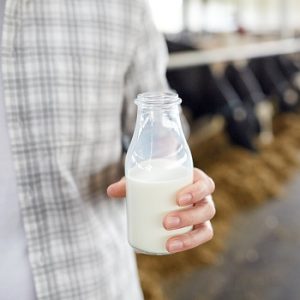
More evidence that low-calorie sweeteners are bad for your health
Studies show that artificial sweeteners can raise the risk of hypertension, metabolic syndrome, type 2 diabetes and heart disease, including stroke.

Certain things are immutable truths.
Entertainers will always ‘go for the crotch’ (as someone once delicately put it) when they can’t come up with anything better or more creative to say.
And newspapers will always claim that babies are at risk when they have a story so thin that it’s almost no story at all.
Thus today’s headlines, of which this from the Guardian is typical: “Organic and UHT milk could put unborn babies at risk, says study“.
So let’s unpick some of the details.
First of all, there is no new discovery from this study which shows that organic (& UHT) milk contain lower levels of iodine than conventional milk. Indeed, it is an old story that is always told badly.
Organic milk has long been known to contain around 2/3 the amount of iodine of conventional milk. This is because organic cows are not routinely given iodine supplements. However organic farmers are now moving towards enriching their grazing land with iodine-rich products, such as calcified seaweed and also supplementing cows’ diets with organic iodine. Thus these differences are likely to disappear in the near future.
Is milk our only, or best, source of iodine? No. We get about 40% of our iodine from dairy products – that means we get 60% from other things. Iodine it is also present in sea vegetables, fish, shellfish, eggs and pulses. A varied diet remains the best way to get all you need.
Nevertheless, studies, particularly amongst women of childbearing age, do seem to show that we are not getting the iodine we need. But why? Simplistic answers like what kind of milk we drink are almost always wrong.
The relevant question no one asks is: are we really getting less than we need or is something stopping our bodies from absorbing what is there.
Not long ago we posted an important news story about fluoride and hypothyroidism. It has long been known that fluoride displaces iodine within the body, thereby affecting the functioning of thyroid gland.
Fluoridation has also been long linked to lower IQ. A great deal of research on this has come out of China. There researchers have repeatedly found that an iodine deficiency coupled with fluoride exposure is significantly more damaging to the developing brain than iodine deficiency alone. A recent English language review by Harvard researchers supports this.
In fact, a consistent body of animal and human research shows that fluoride exposure worsens the impact of iodine deficiency.
Fluoride belongs to the halogen family, a group of elements that includes fluorine, bromine, chlorine and iodine. Iodine is easily displaced in the body by the others, all of which are ubiquitous in our water and food.
Bromide, for example, can be found in several forms. Methyl bromide is a pesticide used mainly on strawberries, brominated vegetable oil (BVO) is added to citrus drinks and sodas to help suspend the flavouring in the liquid. Potassium bromate is a dough conditioner found in commercial bakery products and some flours and our homes are full of flame retardants such as polybromo diphenyl ethers or PBDEs and these too get into our food.
So we need to clean up our food and water supply. But we also need to remember that iodine is not the only thing necessary for healthy fetal brain development. Other important factors include protein, energy, certain fats, iron, zinc, copper, selenium, vitamin A, choline and folate.
Organic milk – the most researched of all organic foods – has many of these elements in spades. Studies show that organic whole and semi-skimmed milk have greater concentrations of protein and polyunsaturated and conjugated linoleic acids (CLA) compared to conventional milk, and also have more favourable fatty acid profiles in general.
Breastfeeding mums who consume organic dairy and meat produce more brain-building EFAs in their breastmilk.
To make today’s study really relevant we need to know more than just the crude figures of what is or isn’t in milk. We need to know what stops ups from wringing every last nutrient from what we eat.
Fetal brain development is complex and doesn’t lend itself well to media soundbites. A nutrient that promotes normal brain development at one time may be toxic at another point in gestation. Similarly, a nutrient that promotes normal brain development at one concentration may be toxic at another. A woman’s body is supremely – even miraculously – well equipped to regulate the flow of necessary nutrients to her growing baby – IF SHE IS, HERSELF, WELL NOURISHED.
Instead of trying to make women feel guilty about choosing organic milk we must pull back and see the bigger picture of mother and infant nutrition for what it is. If we want our children to be healthy and smart let’s waste no more time on stupid stories like this and spend more time ensuring that every mother in the country is fed well and able to give her developing child the best possible start in life.
Pat Thomas, Editor

Please subscribe me to your newsletter mailing list. I have read the
privacy statement